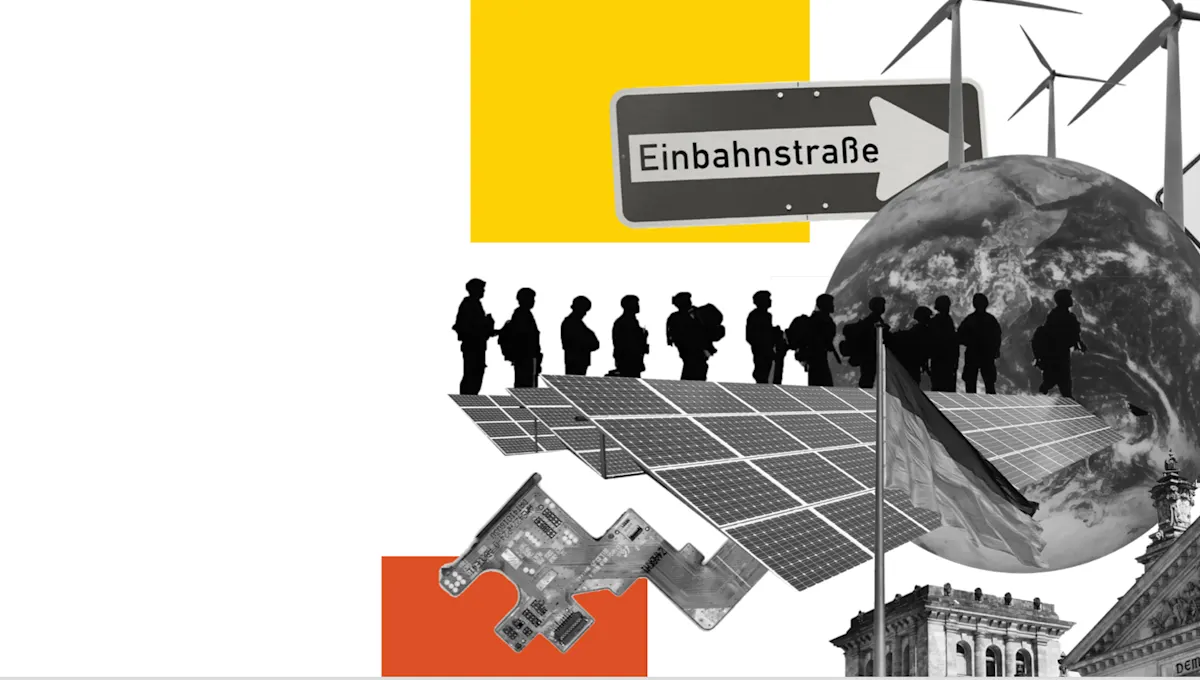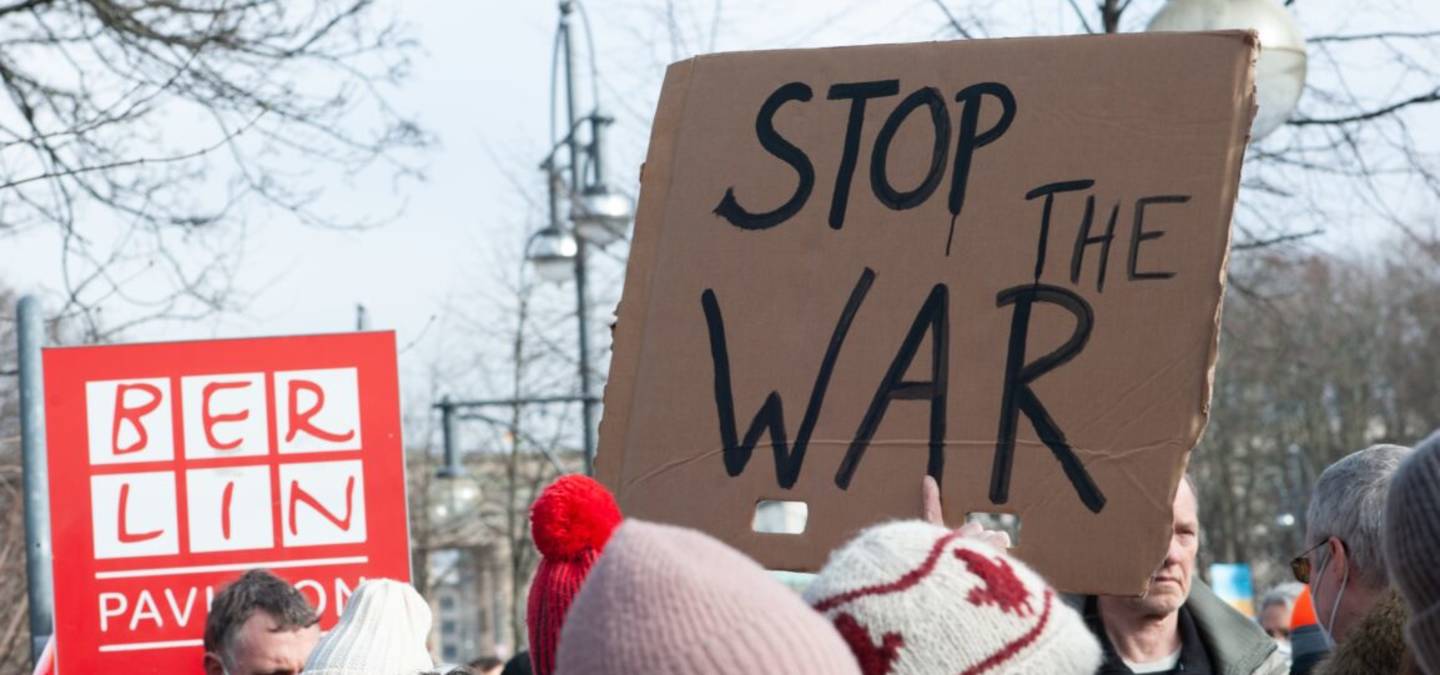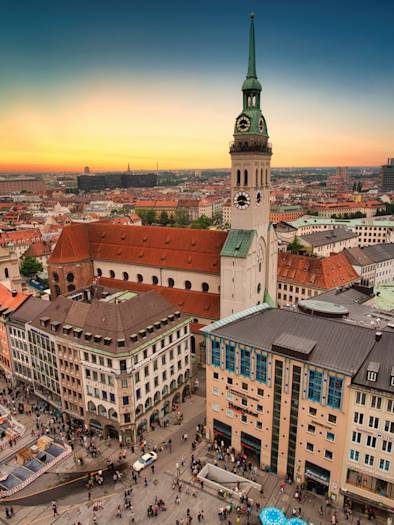
1 Year of Zeitenwende: Coming to Grips with a Multi-Crisis World – Where Is Germany Headed?
Germany’s current federal government took office in December 2021. The so-called “traffic light” coalition of Social Democrats (SPD), the Greens, and the liberal Free Democrats (FDP) had agreed on an ambitious agenda of change and transformation – specifically in the areas of digitization and the energy transition. Only two months later, the Russian invasion of Ukraine changed everything and overturned perhaps permanently a series of fundamental convictions of German politics, many of which had been held for decades (“change through trade”, dialogue and diplomacy above all else, close energy relations with Russia, reaping the “peace dividend” by scaling down the armed forces, etc.).
On 27 February 2022 – just three days after the Russian invasion – Chancellor Olaf Scholz (SPD) gave a speech outlining Germany’s response and new priorities. Scholz declared the Russian attack to have caused nothing less than a Zeitenwende, an “epochal tectonic shift”[1]. Regarding the impact on German politics, he appeared to say that he is not concerned with gradual changes, but with a new state of affairs. This was to apply above all to Germany’s rusty military defense capabilities, but other areas – first and foremost energy relations with Russia – were also to be completely reassessed against the backdrop of the attack on Ukraine. The aspect of his speech that was arguably most memorable was the €100 billion special fund that was to be used to get the German armed forces, the Bundeswehr, back on its feet.
Now that a year has passed, with no end in sight of the war in Ukraine and more than 1 million Ukrainian refugees living in Germany, the question arises as to what has become of the ambitions outlined in Olaf Scholz’s Zeitenwende speech, what course Germany is actually steering in the new reality apart from programmatic speeches, what this means for the political landscape in Germany, and, not least, what it means for business and the economy overall.
Readjusting the Business Model
It has been said that Germany’s “business model” of the past decades has been characterized by three main dependencies: on the USA for security, on Russia for energy and on China for exports. This picture may be overdrawn, but it undoubtedly contains some truths.
The model worked very well as long as a rules-based international order was considered the norm by German business and political elites – exceptions notwithstanding. With Russia’s attack on Ukraine, however, the time of illusions is over. While there is a broad consensus that the upheavals require a significant change of course, there are – unsurprisingly – quite different opinions on how exactly Germany should position itself internationally and how its (geopolitical) business model should be adjusted. In view of these uncertainties, some observers have stated a German “identity crisis.”
What are the main elements of this crisis, where do the fault lines of the debate run, both in the public sphere and among political decision-makers?
Domestic Political Developments
Let’s start with a brief look at domestic politics, one third into the current legislative term and one year after Scholz’s Zeitenwende speech:
There are no “mid-terms” in German politics, but there is a regular stream of state elections in the 16 federal states. In 2023, these are the repeat election in Berlin (12 February) and the regular state elections in Bremen (14 May) as well as Bavaria and Hesse (both on 8 October).
Due to the peculiarities of individual federal states, the results of these elections should not be taken as a direct reflection of the political mood in the country. However, they do represent relevant trends and give indications of fundamental developments. The election in Berlin clearly showed the conservative CDU on the upswing, while the SPD and especially the FDP are having a hard time with voters. While the Berlin result may have to do with the particular disappointment of many voters with conditions in the German capital, it is conceivable that these trends will be confirmed in the upcoming state elections. Therein lies a real explosive for the coalition at the federal level.
From the point of view of its supporters, the situation of Olaf Scholz’s SPD is anything but pleasing. While the dust has settled somewhat in recent months over the party’s alleged longstanding pro-Russia stance, many observers note a lack of leadership and clarity on key issues. Domestically, the polling results for the SPD have fallen back from the heights they reached for a few months before and after the federal election in September 2021 and are currently at around 20% at best – with no visible prospects of improving anytime soon as the party currently seems to lack a distinguishable narrative.
However, the stark lines of conflict between the two smaller members of the governing federal coalition, the Greens and the FDP, are observed with even greater attention.
Especially for the FDP, junior partner in the government coalition at the federal level, the situation is becoming increasingly difficult. The Berlin election was the fifth state election in a row with losses – the result of 4.6% was not even enough to get into the state parliament again. It is hardly possible to explain this negative run without reference to many potential FDP voters’ disappointment with the party’s role in the federal government. While they had expected the traditionally fiscally conservative FDP to effectively counter overly progressive and free-spending ideas of its Green and Social Democratic coalition partners with fiscal restraint, things have played out very differently.
The Greens, like the FDP, have already had to make compromises in the coalition that were difficult for their base to accept and earned them criticism from climate protection activists. However, they have so far managed to confirm their 2021 federal election result in the polls. The two outstanding players in the party – Robert Habeck, Vice-Chancellor and Minister for Economic Affairs and Climate Action, and Foreign Minister Annalena Baerbock – are performing their tasks with great self-confidence and a sense of purpose. While Habeck has stood out with a pronounced pragmatism, for example in dealing with the energy crisis, Baerbock tries to distinguish herself with trenchant idealism in foreign policy. The relationship between the two is considered tense, not least because both are believed to position themselves as their party’s candidate for the chancellorship in the next federal election, scheduled for 2025.
Differences of opinion between the Greens and the FDP are manifold, ranging from the very abstract and ideological (role of the state vs. individual responsibilities) to the very specific. Current examples of the latter include the planned bans on oil and gas heaters in Germany from 2024 and on the registration of internal combustion engines in the EU beyond 2035 (both supported by the Greens and vehemently opposed by the FDP).
Given its poor showing in past state elections and the polls, many observers expect the FDP to increasingly focus on its core issues in the coming months and to be less willing to compromise with its coalition partners going forward. This could have serious consequences for the climate within the governing coalition.
Meanwhile, the CDU, the largest opposition party, did very well in the Berlin election and also registers by far the strongest results in nationwide opinion polls. However, whether this is a sign of the CDU’s strength or rather a sign of the weakness of the current federal government remains an open question. After 16 years of heading the federal government (2005-2021), the CDU currently enjoys the comfortable situation of an opposition party which can criticize many things but does not always have to make final decisions on difficult considerations and trade-offs.
Against this domestic political backdrop, we are now going to take a look – without claiming to be exhaustive – at some of the central political fault lines of the coming months.

Foreign Policy
Despite the growing frustration with the fact that an end to the Ukraine conflict seems unlikely anytime soon and also in spite of growing criticism of the government’s pro-Ukraine stance on the far-left and the far-right, no significant changes in the German support for Ukraine are to be expected in the near future. This position is represented very visibly and resolutely by Foreign Minister Annalena Baerbock and more reservedly and deliberately by the Chancellor. This change in style reveals a fundamental political and emotional conflict between Scholz and Baerbock. Some observers even suspect an underlying power struggle between the chancellery and the foreign ministry over the direction of German foreign policy.
The recent announcement, with great PR effort, of a “feminist foreign policy” as the guideline for Germany’s diplomacy, also fits the image of an idealistic foreign minister deeply convinced of her mission. It would have been difficult to imagine the hyper-pragmatic and sober Olaf Scholz making this announcement.
The question of Germany’s future strategy toward China remains largely unresolved. While there is no lack of warnings that Germany should not repeat the mistake of dependence on Russian energy supplies with China in other fields (the government’s coalition agreement already talked about a “systemic rivalry”), there is still a great closeness to China in German business circles. The huge country remains very attractive both as a production location and as a market, and it is difficult for the globalized and export-driven German economy to find viable alternatives.
In addition to these geopolitical crises, there are numerous other controversial issues on which the opinions of the coalition partners do not always coincide. After Finance Minister Christian Lindner (FDP), of all people, had to incur record debts during the energy crisis, he wants to flip the fiscal policy switch this year. At home, he wants to adhere to the debt brake. And in Europe, he wants to prevent unrestrained debt creation. Against this backdrop, difficult discussions about the urgently needed reform of the European Stability Pact are on the horizon.
Defense
Over many years, Germany’s armed forces, the Bundeswehr, has been subject to budget cuts (“peace dividend”), debates about its role, and an evaporation of support – both from policymakers as well as the general public.
Reforming the Bundeswehr and its procurement processes remains a crucial and daunting task. Many observers are disappointed by the progress made so far on this issue a full year after Scholz’s Zeitenwende speech. It is still not clear exactly what large parts of the €100 billion special fund are to be spent on, let alone have the corresponding contracts been awarded. More and more voices are arguing that the sum will be far from sufficient anyway, given the poor state of the Bundeswehr.
Going forward, much will depend on the performance of the new Minister of Defense, Boris Pistorius (SPD), who recently replaced his rather awkward predecessor.
Energy and Climate
The immediate challenge posed by the Russian attack on Ukraine was to secure energy supplies in the short and medium term. This was achieved through a series of prioritized measures, including the purchase of large volumes of natural gas on world markets, the construction of several LNG import terminals at record speed, the state taking control of two major gas import companies, and the short-term extension of the operating lives of the last German nuclear power plants. Additionally, the federal government created a massive emergency aid package to contain the impact of enormously high energy costs on companies and households.
These measures prevented short-term societal upheaval. However, they have also resulted in enormous costs and thus represent a major burden for the work of both current and future federal governments – and, of course, for the taxpayers.
In the longer term, the German economy is to become climate-neutral by 2045 without losing competitiveness in the process. That is the stated goal of the federal government and the war in Ukraine and the ensuing energy crisis has not changed that. An industrial strategy is currently being drawn up at the Federal Ministry for Economic Affairs and Climate Action to specify the way forward. The plan is likely to include a mix of subsidies, incentive programs, tax cuts and bureaucracy reduction, but the details are not yet clear and will most certainly be controversial.
The central element of energy policy will in any case be the expansion of renewables. By way of example, renewables are expected to cover 80% of Germany’s electricity needs as early as 2030 – in view of historical experience and the current rate of expansion, this is a target the achievement of which seems almost inconceivable. A key issue is the implementation of numerous renewables and energy infrastructure projects at the local level, and herein lies enormous potential for delay. Only time will tell whether there will actually be sufficient public acceptance for accelerated approval procedures.
The situation becomes even more complicated when we look at other areas, such as the heating market and the transport sector.

Digitization
Alongside energy and climate, digitization was the second major topic in the government’s coalition agreement. However, in view of the immediate crises to be managed, the topic of digitization has received less public attention than had been expected. Nevertheless, much is moving in this area. In its digital strategy, the government has defined key projects to accelerate digitization in Germany: The nationwide gigabit expansion and the availability of data, secure and user-friendly digital identities, and modern registers. Another key objective is being an active part in setting international standards, which are important for the cross-border use of technologies such as automated driving.
Health
After the pandemic, Germany’s healthcare system is under pressure in many respects and numerous weak points are standing out clearly. There is a massive shortage of skilled workers in an aging society and costs are rising enormously. So far, it is unclear how these additional costs are to be dealt with. At the same time, there are calls for import dependency on countries outside the EU to be reduced, especially in the pharmaceutical sector.
The Federal Minister of Health has announced two major legislative packages to reform the healthcare system. In addition, a fundamental reimbursement and structural reform of inpatient hospitals is to be carried out together with the 16 federal states by the end of the year.
Zeitenwende – Merely a Buzzword?
In their commentaries on the anniversary of Olaf Scholz’s Zeitenwende speech, many observers criticized the German government by saying that too little has happened, that the Zeitenwende has been nothing but a buzzword. This criticism was to be expected, but it is also disingenuous in some respects.
On the one hand, it is important to point out that the term Zeitenwende was meant primarily as a description of a new international reality (brought about by the Russian attack on Ukraine), not as the title of a new political program in Germany (although that is what the media made it out to be).
Second, the criticism understates the fact that German policy has indeed evolved significantly in several respects. These include, to name just a few examples, important initial decisions in the areas of military procurement (e. g. F-35), arms exports to Ukraine, as well as securing energy supplies.
Third, critics underestimate, in some cases intentionally, the complexity of some projects. For example, the structure of military administration and defense procurement processes have their own logic, characterized by highly specialized technical requirements, few suppliers and very high investment volumes. The reorganization of energy supplies, to cite another example, with its multi-layered objectives – security of supply for both industry and private households combined with somewhat affordable energy prices and a simultaneous course toward climate neutrality – is a mammoth task for several decades.
Outlook
The need for fundamental reforms has been discussed in German politics for many years. At the same time, political stability, unusual by international standards, has arguably contributed to the success of the German model of the past. In several spheres, however, it is now becoming emphatically clear that things can no longer continue in the usual way. For example, the climate targets that have been adopted create enormous immediate pressure for change, both for the economy as a whole and for ordinary citizens. The external shock of the Russian invasion of Ukraine and new uncertainties in the relationship with China require new thinking on foreign and security policy.
After many years of strong political support for globalization and free trade, the issue of sovereignty is back on the agenda and being reassessed in many ways. This affects areas as diverse as energy supply, critical infrastructures, pharmaceuticals, and semiconductors.
A plethora of more domestic issues are also highly contentious with mounting pressure to change. Migration and integration, education, the pension system, the shortage of skilled workers, and infrastructure rehabilitation – these keywords are just a few examples of a much longer list.
Less than a year and a half ago, Germany’s current federal government embarked on a comprehensive reform program with a coalition agreement entitled Daring More Progress. This was supposed to be a legislative period of change and transformation. It has turned out to be one characterized by multiple external and internal crises. The decisions of the coming months and years will have a decisive impact on the Germany of the future, the shape of which is only slowly coming into focus.
[1] Olaf Scholz in Foreign Affairs, January/February 2023







